Chlorella (Chlorella pyrenoidosa) is hailed as a “superfood,” a nutrient-rich algae that’s packed with proteins, vitamins, minerals, and antioxidants. Research suggests that chlorella offers numerous health benefits, such as lowering cholesterol, improving immune function, and aiding in the elimination of heavy metals from the body. This article will delve into the nutritional value of chlorella, its potential health advantages, and the relevant scientific research. We will also provide some high-quality chlorella supplements for your consideration. However, it’s essential to note that if you plan to add chlorella as a dietary supplement, it’s advisable to consult a doctor or nutritionist to ensure that it aligns with your health condition and nutritional requirements.
What is Chlorella?
Chlorella is a type of single-celled green freshwater algae, mainly found in Taiwan and Japan. There are over 30 identified species of chlorella, but the most commonly studied ones are Chlorella vulgaris and Chlorella pyrenoidosa.
This algae is rich in proteins, fats, carbohydrates, dietary fiber, chlorophyll, vitamins, and minerals, making it a valuable source of nutrients. However, its cell wall is tough and indigestible for the human body, necessitating processing to make its nutrients bioavailable. In the United States, chlorella is primarily available as capsules, tablets, powder, or liquid extracts for use as nutritional supplements.
Beyond its role as a human dietary supplement, chlorella shows promise as a biofuel, offering a sustainable food and nutritional source for the growing global population. Some studies suggest that chlorella, due to its high protein content and other nutrients, could serve as a viable food source to meet the demands of a growing world population. Others propose its use as an alternative to agricultural feed and a renewable fuel source. [1] Trusted Website ScienceDirect.com is a trusted database of scientific and medical publications. Open the link →
The Nutritional Value of Chlorella
While the specific nutritional content can vary based on growth conditions, algae species, and supplement processing, chlorella boasts a rich array of nutrients, including vitamins, minerals, antioxidants, and Omega-3 fatty acids.
- Protein: Chlorella contains approximately 50-60% protein, constituting a complete protein source, encompassing all nine essential amino acids required by the human body. [2] Trusted Website PubMed is a data base from US National Institutes of Health. It’s a trusted source of health and medical information. Open the link →
- Vitamin B12: Certain chlorella varieties are notably high in vitamin B12, a critical nutrient for overall health. [3] Trusted Website PubMed is a data base from US National Institutes of Health. It’s a trusted source of health and medical information. Open the link →
- Iron and Vitamin C: Depending on the supplement type, it can provide 6-40% of the daily iron requirement, while its abundant vitamin C content enhances iron absorption. [4] Trusted Website PubMed is a data base from US National Institutes of Health. It’s a trusted source of health and medical information. Open the link →
- Antioxidants: Chlorella contains multiple antioxidants that help combat free radicals, protecting the body from oxidative stress.
- Other Vitamins and Minerals: Chlorella also supplies small amounts of magnesium, zinc, copper, potassium, calcium, folic acid, and other B vitamins, essential micronutrients for the human body.
- Omega-3 Fatty Acids: A 3-gram serving of chlorella provides around 100 milligrams of Omega-3 fatty acids. [5] Trusted Website Wiley.com is a U.S. publishing company that specializes in academic content with 200 years of history. Open the link →
- Fiber: While consuming chlorella can contribute to dietary fiber intake, most supplements contain less than 1 gram of fiber.
The Health Benefits of Chlorella
Detoxifying Heavy Metals:
Studies suggest that chlorella has the ability to eliminate heavy metals and harmful compounds from the body, enhancing natural detoxification processes.
“Heavy metals” include elements that are essential in appropriate amounts, such as iron and copper. However, excessive amounts of heavy metals like cadmium and lead can be toxic. Exposure to these heavy metals can occur through environmental pollution or specific occupations like mining.
Research indicates that chlorella can mitigate the toxicity of heavy metals in the liver, brain, and kidneys. [6] Trusted Website NCBI, US National Center for Biotechnology Information, is a trusted source of biotechnology and biomedicine information. Open the link → Additionally, chlorella may reduce the presence of harmful chemicals in food, such as dioxins, which can contaminate the food supply chain and disrupt hormone levels. [7] Trusted Website PubMed is a data base from US National Institutes of Health. It’s a trusted source of health and medical information. Open the link →
Strengthening the Immune System:
Although current evidence is not conclusive, several animal and human studies suggest that chlorella can enhance the immune response.
- In a small study, individuals consuming chlorella showed higher antibody production compared to those taking a placebo. Antibodies are crucial components of the immune system, defending the body against pathogens, indicating that chlorella may aid in strengthening immune responses. [8] Trusted Website PubMed is a data base from US National Institutes of Health. It’s a trusted source of health and medical information. Open the link →
- In another small-scale 8-week study, healthy adults who consumed chlorella showed an increasing trend in immune activity markers. [9] Trusted Website PubMed is a data base from US National Institutes of Health. It’s a trusted source of health and medical information. Open the link →
However, research results are not entirely consistent, with some studies showing only marginal effects of chlorella. For instance, in one study, participants aged 50-55 experienced improved immune function with chlorella supplementation, but the effect was not significant for those aged 55 and above. [10] Trusted Website PubMed is a data base from US National Institutes of Health. It’s a trusted source of health and medical information. Open the link →
Further research is needed to better understand how chlorella influences the immune system. It is hypothesized that chlorella may enhance immune function by increasing the activity of various components of the immune system.
Cholesterol Improvement
Multiple studies indicate that chlorella effectively helps lower cholesterol levels. Research shows that daily intake of 5-10 grams of chlorella significantly reduces total cholesterol, low-density lipoprotein cholesterol, and triglyceride levels in patients with mild hypertension and/or mild hypercholesterolemia. [11] Trusted Website PubMed is a data base from US National Institutes of Health. It’s a trusted source of health and medical information. Open the link →
chlorella contains several components believed to improve blood lipid levels:
- Niacin: This B-complex vitamin has been shown to lower cholesterol.
- Fiber: Fiber is known to help lower cholesterol levels.
- Carotenoids: Numerous studies demonstrate that carotenoids have natural cholesterol-lowering effects. [12] Trusted Website PubMed is a data base from US National Institutes of Health. It’s a trusted source of health and medical information. Open the link →
- Antioxidants: Antioxidants can prevent the oxidation of low-density lipoprotein cholesterol, a significant factor in the development of heart disease. [13] Trusted Website PubMed is a data base from US National Institutes of Health. It’s a trusted source of health and medical information. Open the link →
Prevention of Chronic Diseases
Chlorella contains chlorophyll, vitamin C, β-carotene, lycopene, and lutein, all of which contribute to resisting the development of various chronic diseases.
- Some antioxidants can effectively reduce the formation of advanced glycation end products (AGEs), considered a major driving factor in many complications of diabetes. [14] Trusted Website PubMed is a data base from US National Institutes of Health. It’s a trusted source of health and medical information. Open the link →
- Studies also indicate that chlorella supplementation effectively increases antioxidant levels in chronic smokers. This suggests that chlorella may help counter oxidative stress caused by smoking, reducing the risk of chronic diseases in smokers. [15] Trusted Website PubMed is a data base from US National Institutes of Health. It’s a trusted source of health and medical information. Open the link →
As a natural source of antioxidants, chlorella may play a crucial role in preventing and resisting chronic diseases. However, specific effects and mechanisms need further research for clarification.
Blood Pressure Control
Multiple studies have confirmed that chlorella contributes to blood pressure control.
- In a study involving individuals with mild hypertension, those who consumed 4 grams of chlorella daily exhibited significantly lower blood pressure levels compared to placebo users at the end of the study. This finding highlights the potential benefits of chlorella in blood pressure control. [16] Trusted Website PubMed is a data base from US National Institutes of Health. It’s a trusted source of health and medical information. Open the link →
- Another study involving healthy males found that the degree of arterial stiffness was lower in those taking chlorella supplements. Arterial stiffness is a significant risk factor for heart disease and hypertension, confirming the cardiovascular benefits of chlorella. [17] Trusted Website PubMed is a data base from US National Institutes of Health. It’s a trusted source of health and medical information. Open the link →
One theory explaining these research findings is that certain nutrients found in chlorella, such as arginine, potassium, calcium, and Omega-3 fatty acids, help protect arteries, preventing arterial stiffness.
Blood Sugar Improvement
The potential role of chlorella in reducing blood sugar levels has garnered widespread attention.
- In a study involving healthy individuals and those at high risk of lifestyle-related diseases, 12 weeks of continuous chlorella consumption led to lower fasting blood sugar levels. This suggests that chlorella may aid in blood sugar control, potentially holding importance in diabetes prevention and management. [18] Trusted Website PubMed is a data base from US National Institutes of Health. It’s a trusted source of health and medical information. Open the link →
- Another study showed that chlorella supplementation improved blood sugar control and increased insulin sensitivity in patients with non-alcoholic fatty liver disease (NAFLD). NAFLD patients often exhibit insulin resistance, and this research offers new therapeutic possibilities. Non-Alcoholic Fatty Liver Disease (NAFLD) Improving blood sugar control in patients has a positive impact and can enhance their insulin sensitivity. Non-Alcoholic Fatty Liver Disease patients often have insulin resistance, and this research provides a new treatment approach for such patients. [19] Trusted Website PubMed is a data base from US National Institutes of Health. It’s a trusted source of health and medical information. Open the link →
Managing Respiratory Diseases
The antioxidants found in chlorella may have anti-inflammatory effects, which could potentially aid in improving asthma and other respiratory diseases. However, further research is required to fully understand its application in this field.
Managing respiratory diseases, such as asthma and chronic obstructive pulmonary disease (COPD), often involves controlling inflammation. Chlorella contains multiple antioxidants that are believed to neutralize free radicals, reduce damage to human cells, and potentially alleviate inflammation.
However, while studies have found that chlorella supplements improved the antioxidant status of COPD patients, it did not necessarily translate to a significant improvement in their respiratory capabilities. This suggests that while chlorella may enhance overall antioxidant status, it may not be sufficient to alter the course of the disease. [20] Trusted Website PubMed is a data base from US National Institutes of Health. It’s a trusted source of health and medical information. Open the link →
Enhancing Aerobic Endurance
Chlorella may have a positive impact on enhancing aerobic exercise endurance. Although scientific research on this topic is relatively limited, some studies have found that supplementing with chlorella has positive effects on aerobic endurance.
- In one study, adults taking 6 grams of chlorella supplements daily showed significant improvement in lung oxygen saturation at the end of the research. Lung oxygen saturation is an important indicator of aerobic exercise endurance. In contrast, the aerobic endurance of the placebo group remained unchanged. [21] Trusted Website PubMed is a data base from US National Institutes of Health. It’s a trusted source of health and medical information. Open the link →
This result may be related to the presence of branched-chain amino acids in chlorella. These amino acids, which consist of leucine, isoleucine, and valine, have been shown to improve aerobic performance. [22] Trusted Website NCBI, US National Center for Biotechnology Information, is a trusted source of biotechnology and biomedicine information. Open the link →
Additional Potential Benefits
Regarding other potential benefits of chlorella, some viewpoints are worth considering. However, as of now, many of these claims are based on theories or preliminary scientific research, and there is insufficient evidence to fully support them:
- Promoting Eye Health: chlorella contains two carotenoids – lutein and zeaxanthin – which have been shown to protect eye health and lower the risk of conditions like macular degeneration. [23] Trusted Website PubMed is a data base from US National Institutes of Health. It’s a trusted source of health and medical information. Open the link →
- Supporting Liver Health: Some studies suggest that chlorella supplements may improve liver health indicators in certain liver diseases. However, further research is required to determine its effects on healthy individuals and the specific mechanisms involved. [24] Trusted Website NCBI, US National Center for Biotechnology Information, is a trusted source of biotechnology and biomedicine information. Open the link →
- Improving Digestion: Chlorella is often claimed to improve digestion and reduce bloating, but there is currently insufficient research evidence to support these claims.
- Easing Premenstrual Syndrome (PMS): Some believe that chlorella can alleviate PMS symptoms such as mood swings and fatigue, but scientific support in this area is currently limited. [25] Trusted Website NCBI, US National Center for Biotechnology Information, is a trusted source of biotechnology and biomedicine information. Open the link →
Safety, Side Effects, and Drug Interactions
The FDA classifies chlorella as “generally recognized as safe,” and there have been few reports of side effects. However, this does not mean it is suitable for everyone. When considering chlorella supplements, it’s essential to consider the following:
- Side Effects: Some people may experience symptoms like nausea and abdominal discomfort.
- Regulatory Oversight: Some countries, including the United States, do not regulate supplements.
- Variability: Chlorella supplements may vary in nutritional content due to factors such as algae species, growth environment, and processing methods.
- Immune System Impact: Chlorella can influence the immune system, making it potentially unsuitable for those with compromised immune function or individuals undergoing immune-modulating drug therapy.
Additionally, there is currently insufficient scientific evidence to determine the precise dosage of chlorella required for specific effects. Some studies suggest that a daily intake of 1.2 grams of chlorella may be beneficial, while others investigate doses ranging from 5 to 10 grams daily. Most chlorella supplements recommend a daily intake of 2-3 grams, which appears to be safe based on existing research.
Dietary supplements may interact with certain medications, so caution should be exercised:
- Chlorella may decrease the effectiveness of warfarin: Chlorella contains a significant amount of vitamin K, which assists in blood clotting. Warfarin, on the other hand, is used to slow down blood clotting.
- Chlorella may also increase sensitivity to sunlight: It may elevate the risk of sunburn, blistering, or rash when exposed to sunlight. Ensure to apply sunscreen and wear protective clothing.
Recommended Chlorella Supplements
Sun Chlorella: High-quality Chlorella Supplement
Sun Chlorella is a brand of algae-based health products introduced by a Japanese company. The brand primarily manufactures and sells algae supplements, particularly chlorella products. Sun Chlorella’s chlorella products are typically available in the form of algae powder, tablets, or capsules.
*Also available in 300/600 tablets and low-dose 200mg options; all prices are as of writing.
Sun Chlorella employs a slightly different processing method for chlorella. While some brands use heating during the processing, which may damage the foundational nutrients of chlorella species, Sun Chlorella does not use heat treatment.
Sun Chlorella’s chlorella products are non-genetically modified, gluten-free, and suitable for vegetarians. They do not contain any artificial colors, chemicals, or flavors. The recommended daily dosage is 12+ tablets, which can be adjusted based on individual tolerance. This chlorella tablet supplement does not require refrigeration and has a mild taste.
Consumers using Sun Chlorella have reported clearer thinking and increased energy levels. Other potential benefits mentioned include improvements in skin and hair health. Some users have also reported a reduction in inflammatory reactions, particularly allergy symptoms and joint pain, after using Sun Chlorella tablets.
Compared to other chlorella supplements, the price of Sun Chlorella is slightly higher.
Ingredient List
| Ingredients | Per Serving (6 tablets) Amount |
|---|---|
| Calories | 10 |
| Total Carbohydrates | <1 g |
| Protein | 2 g |
| Vitamin A | 45 mcg |
| Vitamin D | 27 mcg |
| Riboflavin (Vitamin B2) | 0.1 mg |
| Niacin | 1.1 mg |
| Vitamin B6 | 0.1 mg |
| Folate | 36 mcg DFE |
| Vitamin B12 | 7 mcg |
| Iron | 5 mg |
| Phosphorus | 48 mg |
| Magnesium | 11 mg |
| Chlorella (Powder) | 3 g |
| Lutein | 3 mg |
| α-Carotene | 189 mcg |
| Chlorophyll | 63 mg |
| ω-3 Fatty Acids | 54 mg |
| ω-6 Fatty Acids | 56 mg |
Dr. Mercola: Easily Absorbable Chlorella
Dr. Mercola’s Fermented Chlorella boast a unique fermentation process. The advantage of this process is that it makes the supplement more easily digestible and absorbable. About one-eighth of chlorella consists of Chlorella Growth Factor (CGF), and it is also rich in nucleic acids, RNA, DNA, amino acids, polysaccharides, vitamins, and minerals.
On the iHerb website, this product has received high customer ratings of up to 4.8/5 and is one of the most reviewed chlorella supplements. According to reviews, this chlorella has excellent detoxifying and energy-boosting effects. Moreover, people appreciate its compact and portable tablet form, as one bottle can last for 1-3 months.
Ingredient List
| Ingredients | Amount per Serving |
|---|---|
| Calories | 5 |
| Protein | <1 g |
| Fermented Chlorella (Green Algae) | 970 mg |
| Chlorophyll | 13 mg |
Sunfood Super Algae: Praised for Detoxification Effects
Each tablet of Sunfood’s Super Algae contains 250 milligrams of chlorella. On the iHerb platform, Sunfood Super Algae Tablets have an average customer rating of up to 4.6/5. Customers commonly report significant improvements in energy levels, detoxification, and overall nutrition from this super algae tablet. Besides taking the tablets directly, they can also be blended into smoothies for consumption.
*Optional 228/456 tablet packaging; price at the time of writing.
Sunfood uses third-party testing to ensure product quality. The processing method for breaking the cell walls of chlorella involves no chemical substances to retain the maximum nutritional content of chlorella.
The recommended dosage for this supplement is 3 times a day, with 3-4 tablets each time, making it a total of 9-12 tablets per day. This is a relatively high intake for a dietary supplement. It might be to achieve more noticeable detoxification effects, but according to user feedback, it may also lead to side effects like nausea or diarrhea.
Ingredient List
| Ingredients | Amount per Serving (12 tablets) | % Daily Value |
|---|---|---|
| Calories | 10 | |
| Sodium | 15 mgs | 1% |
| Protein | 2 g | |
| Iron | 8% | |
| Vitamin A | 8% | |
| Vitamin B2 (Riboflavin) | 20% | |
| Vitamin B12 | 180% | |
| Phosphorus | 4% | |
| Magnesium | 2% |
Apothékary: Convenient Source of Plant Nutrients
Apothékary Chlorella Powder is a convenient source of plant nutrients, perfect for those who find it challenging to plan meals. Each bottle contains 30g of chlorella, and the recommended dosage is 1-2 teaspoons daily.
Unlike the previously recommended products, Apothékary Chlorella comes in a powder form, making it easy to mix with water for consumption. The manufacturer suggests blending it with coconut milk and bananas or mixing it with warm water and honey to suit personal preferences. Additionally, this chlorella powder can be used as an ingredient in face masks or facial cleansers, helping to improve dull or inflamed skin.
One drawback is that there are relatively fewer customer reviews for this supplement, and the total content per bottle is relatively small, enough for only 12 servings.
Ingredient List
| Ingredient | Amount per Serving (1-2 teaspoons) |
|---|---|
| Chlorella | 2.5 g |
Microingredients: USDA Organic Certified Chlorella
Each bottle of Microingredients Organic Chlorella Powder contains 1 pound (454 grams) of broken-cell wall powder. The price for this supplement is approximately $37, providing 151 servings. It is recommended to consume 1 scoop (3 grams) of powder daily, mixed into a preferred beverage. For accurate measurement, a scoop is included in the packaging. The manufacturer suggests directly consuming the powder as well to increase nutrient concentration and absorption speed.
This algae powder serves as an excellent source of plant-based proteins, chlorophyll, flavonoids, enzymes, amino acids (gamma-linolenic acid, arginine), antioxidants, minerals (magnesium, calcium, potassium, and zinc), and immune vitamins (vitamin B2, vitamin B12, vitamin C, vitamin D, biotin).
Microingredients Organic Chlorella Powder is USDA certified organic, suitable for vegetarians, non-GMO, gluten-free, and packaged in environmentally friendly, recyclable materials. User reviews mention that it mixes well with liquids and has a mild and fresh taste. Some reviews note that the price of this supplement is relatively higher, but considering the larger capacity of one bag providing approximately 151 servings, it is sufficient for a 5-month supply.
Ingredient List
| Ingredient | Amount per Serving (1 scoop) |
|---|---|
| Iodine | 50 mg |
| Protein | 2 g |
| Iron | 1.8 mg |
| Calcium | 2 mg |
| Potassium | 20 mg |
| Carbohydrates | 0.5 g |
Disclosure: We are an Amazon Associate. Some links on this website are affiliate links, which means we may earn a commission or receive a referral fee when you sign up or make a purchase through those links.







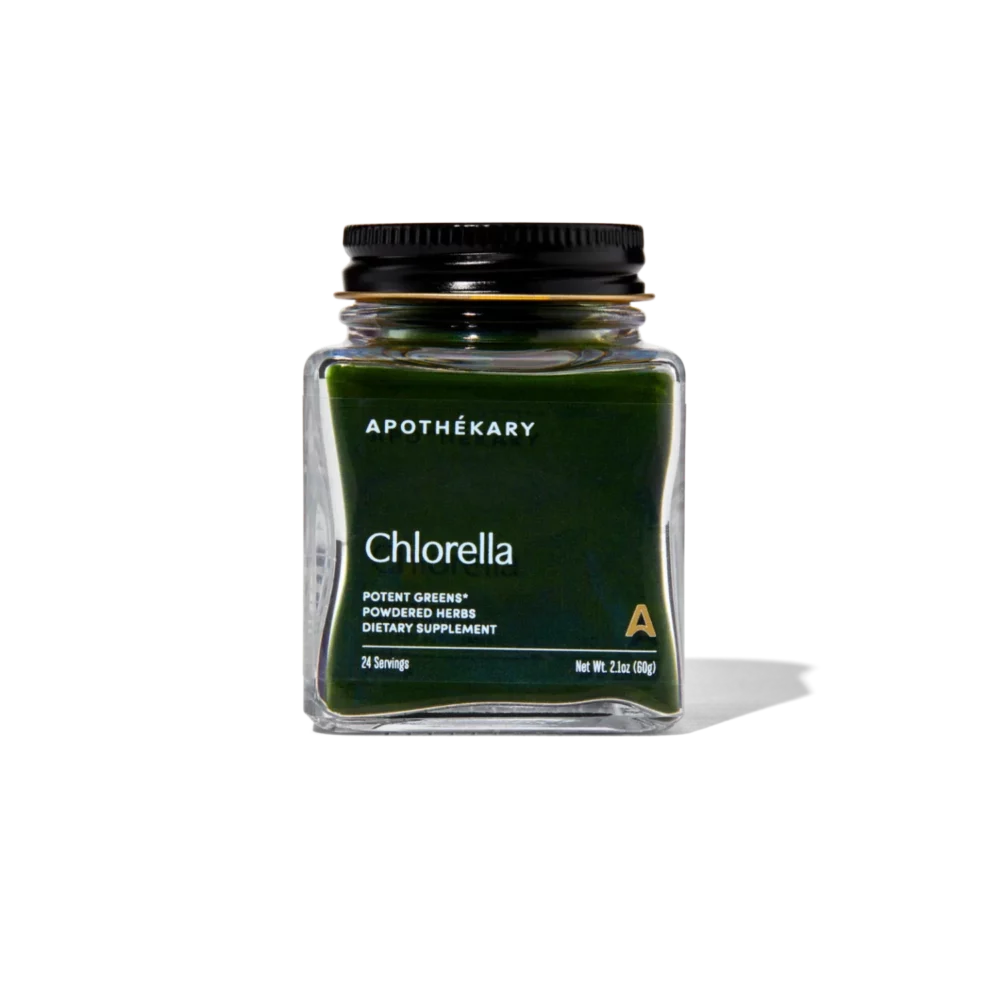
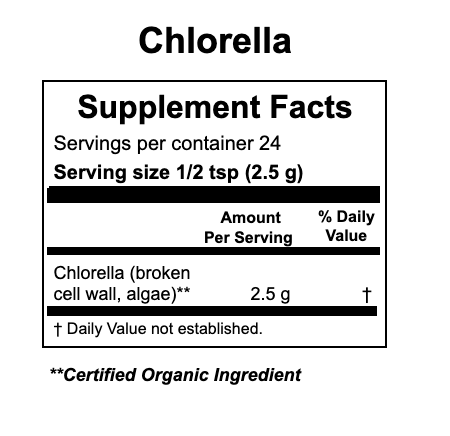
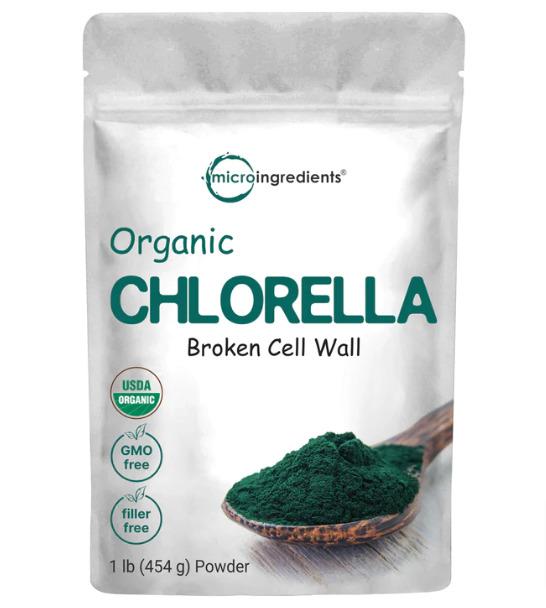
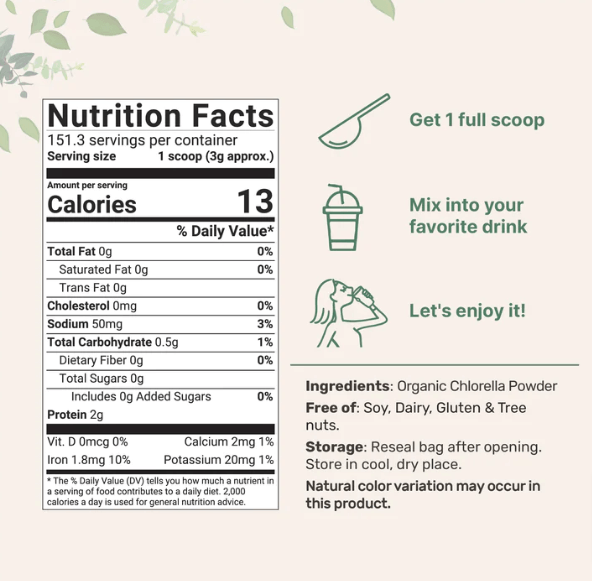
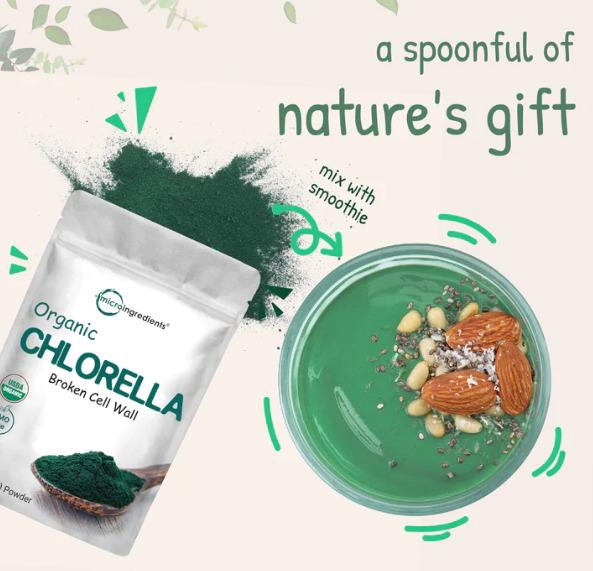











Leave a Reply